“When the disabled volunteers from Beit Halochem visited me in the hospital, they told me about this amazing place that will help me … and it sure did.”
The number of Israel’s casualties from Operation Protective Edge is heart breaking: More than 1,000 were injured — over 600 of whom were hospitalized. For the hundreds who have been wounded or suffer PTSD, the New Year will bring difficult challenges for them and their families.
Even though the fighting has stopped, the battle has only begun for many of our brave heroes as they have now become the newest members of Beit Halochem.
Achiya Klein is one of the 51,000 wounded warriors already assisted by Beit Halochem. Regrettably this number continues to grow.
In October 2013, First Lieutenant Achiya Klein lost his eyesight when a bomb exploded while he was dismantling a terrorist tunnel near the Gaza security fence. He was the squadron commander of the Israeli Engineering Corps combat platoon dedicated to finding and destroying these networks and hidden caches.
While inside the tunnel, a large explosion occurred. Six were wounded. Achiya was the most severely injured, his face crushed and his entire body riddled with shrapnel.
Achiya was in critical condition and on life support. The medical team struggled to save his life. After many days the doctors told his parents that “Achiya will survive but tragically has lost his eyesight.”
Today, less than one year later, thanks to Beit Halochem in Jerusalem and his positive outlook, Achiya is learning to live each day to the fullest with his blindness.
“When the disabled volunteers from Beit Halochem visited me in the hospital, they told me about this amazing place that will help me … and it sure did.”
“I have gained back my strength by receiving regular hydro and physical therapy, and participating in many sport activities such as swimming, tandem bike-riding, running, and wall-climbing. I have met other young veterans who have also been hurt in combat. We encourage and support each other. As long as I have Beit Halochem I am never alone—this makes all the difference to my recovery.”

